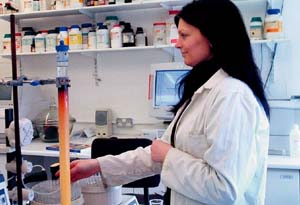| 2004 |

|
YEAR BOOK |
Institute of Technology Carlow
|
Sugar beet – a renewable fuel feedstock
|

1.34 million tonnes of sugar beet are grown in Ireland each year by 3,700 growers based mainly in the southeast of the country. The sugar beet is processed at two plants, one in Carlow and one in Mallow, which yields 200,000 tonnes of sugar. The main byproducts of sugar processing are molasses and sugar beet pulp. The Carlow factory produces 25,000 tonnes of molasses and 80,000 tonnes of sugar beet pulp annually. Molasses and pulp are currently used as animal feed. However, as pulp and the molasses contain substantial amounts of carbohydrates, they have potential as a raw material for the production of fuel ethanol or bioethanol. Molasses contains 50% sucrose, with smaller amounts of fructose and glucose. Sugar beet pulp contains approximately 30% cellulose, 30% hemicellulose, and 30% pectin.
The research at Carlow is concentrating on the enzymatic hydrolysis of the sugar beet pulp to its constituent monomeric sugars – which include glucose, fructose, mannose, galactose, xylose and arabinose. While technology for fermentation of single sugars (particularly glucose) is very well developed, the fermentation of complex mixtures of sugars which include pentoses is not. The use of unconventional fermenting microorganisms to maximize ethanol production is being investigated. The ultimate aim is to work towards the development of new microbial strains with improved properties for the conversion of such waste-derived sugar hydrolysates to ethanol.
Contact: Dr Linda Jennings, Department of Health & Science, Institute of Technology Carlow;
Tel: 059-9170531; E-mail: [email protected]